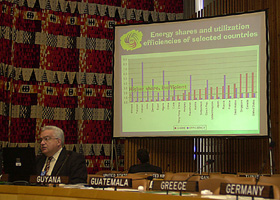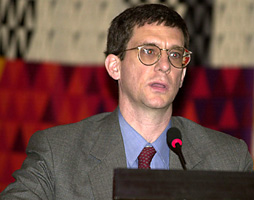|
Briefing by the Ad Hoc Interagency
Task Force on Energy
During
an afternoon briefing, the Ad Hoc Interagency Task Force on Energy
provided an overview of its activities. This
briefing was organized by the FAO, GEF, IAEA, UNDP, UNEP, UNESCAP,
UNESCO, and UNIDO.
Panelists included Gustavo Best, FAO, Alan McDonald, International
Atomic Energy Agency, William Faries, GEF, Luis Marques, UNESCO,
and Pranesh Chandra Saha, Environment and Natural Resources Development
Division, ESCAP (bottom center), Cahit Gürkök, UNIDO, and Thomas
Johansson, UNDP, and Mark Radka, UNEP, Slav Slavov, UN/ECE,
JoAnne DiSano, Chair of the Interagency Task Force, chaired the
briefing discussions.
 |
 Cahit
Gürkök, UNIDO, highlighted
UNIDO's focus on energy programme, including access of the poor
to energy, rational energy use, and climate convention under
kyoto protocol. He said UNIDO was the lead agency for the energy
roundtable at the LDC-III conference to be held in Brussels
from 14-10 May 2001.
Cahit
Gürkök, UNIDO, highlighted
UNIDO's focus on energy programme, including access of the poor
to energy, rational energy use, and climate convention under
kyoto protocol. He said UNIDO was the lead agency for the energy
roundtable at the LDC-III conference to be held in Brussels
from 14-10 May 2001. |
 During the lunch
break, Joanne
DiSano, Chair of the Task Force, said the Task Force will
provide input to the CSD-9 process, and has prepared papers on UN
agency activities and programmes in the area of energy and case
studies by UN agencies and programmes. She introduced representatives
of member agencies of the Task Force, who presented their work on
sustainable energy. Speaking for the UN Division for Sustainable
Development, Joanne DiSano stressed the Division's focus on technical
assistance and capacity-building in partnership with governments.
Thomas
Johansson, Energy and Atmosphere Programme, UNDP, underscored
the role of energy in fighting poverty and advancing sustainable
development, the principle objectives of his agency. Cahit Gurkok,
Industrial Energy-Efficiency Branch, UNIDO (right), provided
case studies on the efforts relating to sustainable energy by his
agency, including on fuel wood replacement and briquetting, micro
and mini-hydro power, and technology transfer.
During the lunch
break, Joanne
DiSano, Chair of the Task Force, said the Task Force will
provide input to the CSD-9 process, and has prepared papers on UN
agency activities and programmes in the area of energy and case
studies by UN agencies and programmes. She introduced representatives
of member agencies of the Task Force, who presented their work on
sustainable energy. Speaking for the UN Division for Sustainable
Development, Joanne DiSano stressed the Division's focus on technical
assistance and capacity-building in partnership with governments.
Thomas
Johansson, Energy and Atmosphere Programme, UNDP, underscored
the role of energy in fighting poverty and advancing sustainable
development, the principle objectives of his agency. Cahit Gurkok,
Industrial Energy-Efficiency Branch, UNIDO (right), provided
case studies on the efforts relating to sustainable energy by his
agency, including on fuel wood replacement and briquetting, micro
and mini-hydro power, and technology transfer.
 |
 Mark Radka, UNEP, highlighted the desire to bring environmental
elements into energy sector decisionmaking at all levels. He
highlighted two programmes undertaken by UNEP, inter alia,
the African Rural Energy Enterprise Development Initiative (AREED
programme), which local entrepreneurs who can bring energy services
to rural communities. He also outline the work of the Sustainable
Energy Advisory Facility, which uses UNEP's collaborating center
on energy and environment and offers advisory services that
help governments restructure policies.
Mark Radka, UNEP, highlighted the desire to bring environmental
elements into energy sector decisionmaking at all levels. He
highlighted two programmes undertaken by UNEP, inter alia,
the African Rural Energy Enterprise Development Initiative (AREED
programme), which local entrepreneurs who can bring energy services
to rural communities. He also outline the work of the Sustainable
Energy Advisory Facility, which uses UNEP's collaborating center
on energy and environment and offers advisory services that
help governments restructure policies. |
Alan McDonald,
Planning and Economic Studies Section, Department
of Nuclear Energy, International Atomic Energy Agency, highlighted
work on indicators for sustainable energy development, which he
said brings together and further develops related indicators from
other initiatives. Highlighting case studies relating to cleaner
production and sustainable energy solutions,
Mark Radka, UNEP Division of Technology, Industry and Economics
(left) , said the efforts are driven by the desire to bring
environmental considerations into decision-making at all levels.
Noting
the importance of energy efficiency and energy pricing and the internalization
of external costs, Slav Slavov, UN/ECE Sustainable Development
Division, highlighted the ECE regional perspective on sustainable
energy. Pranesh Chandra Saha, Energy Resources Section, Environment
and Natural Resources Development Division, UN ESCAP, said there
is a need for financial resources and technology transfer to advance
sustainable energy development in the region. William Faries,
GEF, provided a number of examples of GEF projects relating
to energy, and stressed the role of new institutions and financing
services, and engaging the private sector in the area. Luis Marques,
World Solar Commission, UNESCO, highlighted the World Solar
Program and its implementation. Noting the links between energy
and sustainable livelihoods, Gustavo Best, Environment and Natural
Resources Service, Sustainable Development Department, FAO,
highlighted FAO efforts relating to renewable energy applications.
Wrapping up the briefing session, Joanne DiSano touched on
the option of establishing a more formal basis for the Task Force,
which she said would enhance the cooperation and coordination of
different branches of the UN system with regard to sustainable energy
issues.
|



